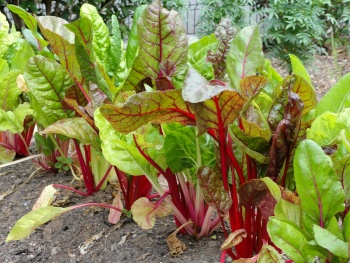Chard
From Wikiwel
(Redirected from Swiss Chard)
Other names : Swiss chard, Silverbeet, Perpetual spinach, Spinach beet, Crab beet, Bright lights, Seakale beet, mangold.
See also : Cruciferous Vegetables
Special Precautions of Chard
Both Swiss chard and spinach contain oxalates, which are slightly reduced by cooking and can bind to calcium, a concern for people prone to kidney stones.
The benefits of Chard are
It may look like the usual green leafy vegetables, but Swiss chard is actually one of the superior greens that must be included in the diet. This is because of the massive health benefits offered by the vegetable itself.
- rich in essential vitamins and minerals.
- high in phytonutrients that are necessary in preventing cancer and in maintaining the health of the cardiovascular system. The phytonutrient flavonoid found in Swiss chard is similar to fruits and vegetables that have been proven to protect the cardiovascular system.
- phytonutrient syringic acid : According to research, this substance helps in regulating the blood sugar inhibiting alpha-glucosidase from breaking down carbohydrates into simple sugar.
- betalains, as found in the yellowish pigment of the leaf : This phytonutrient acts as anti-inflammatory, anti-cancer and detoxifier.
- Chlorophyll-benefits
- Diabetes : Recent research reveals that the leaves of Swiss chard hold an abundance of syringic acid, an antioxidant that has incredible blood sugar stabilizing properties.
- Hemorrhoids : Once you have the chard (in good condition), rinse well and let cool in refrigerator, apply enough leaves on the affected area at least 3 times a day.
